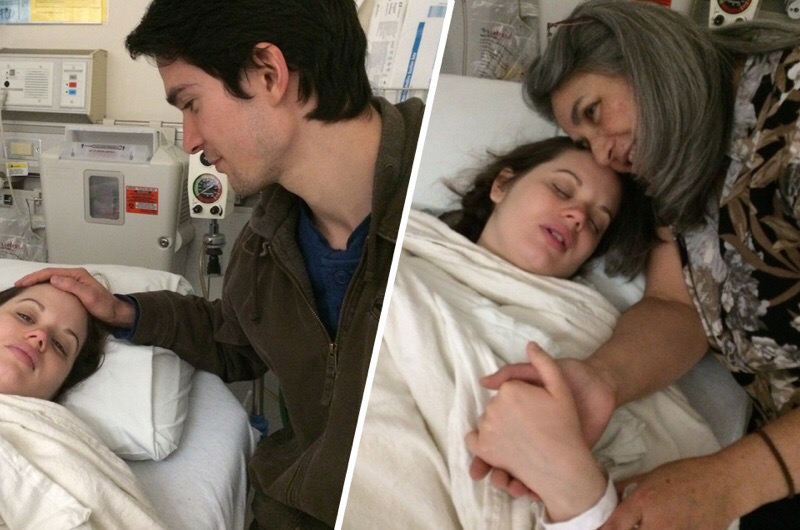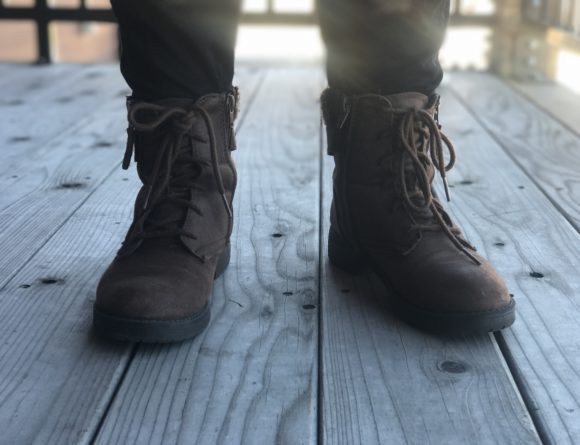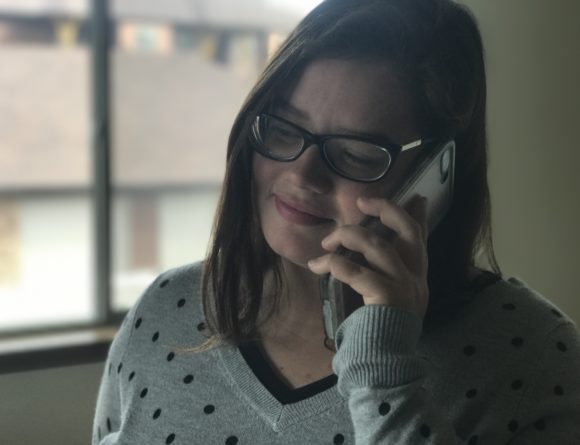At first, I was really struggling with guilt over how this latest setback is affecting him but as it dragged on, I was forced to make peace with it. This issue of guilt came up on the questionnaire I shared a few weeks ago. Some of you mentioned your illness makes you feel like a burden, so I thought I would take today to write about how I deal with those feelings.
First of all, I’ve had to accept that there’s really no way around it. If you have an illness that affects your ability to function you are going to be a burden on those around you from time to time. If your illness is really severe like mine was, you might even be a burden around-the-clock.
I think accepting that the illness is outside of your control is the first step to shedding the guilt. You didn’t choose the illness. The illness is just as much of a burden to you as it is to those who are caring for you. So, really it’s the illness that’s a burden. Not you. It’s not your fault you’re sick.
This means you are free to turn off the guilt machine. It really doesn’t accomplish anything. Brett and my mom can testify that my guilt never made them feel better about their role as caregivers. My guilt didn’t lighten the load or make their job easier.
That being said, there are little things I’ve tried to do to make their job more pleasant. I didn’t always succeed but when I did, it made a difference. I think these ideas are helpful whether you are dependent on full-time caregiving or only need help when you’re having a flare-up.
1. Ask: It was always better to communicate my needs clearly and directly. I know from experience that it can be tempting to wait for them to figure it out and then get upset when they don’t. Don’t do that. Don’t complain. Just ask. Tell them plainly. Don’t assume they know you need something and just aren’t willing to help.
2. Thank: Saying thank you makes a big difference! I tried my best to remember to say it whenever anyone in my family did something for me. Even if it was as small as bringing me a cup of water. Even if it was the thousandth time they’d done that same mundane task for me. Say thank you. Say it over and over. I promise they won’t get tired of hearing it.
3. Acknowledge: Acknowledging how hard my illness is for Brett has been very helpful. Saying that I’m deeply sorry for the way way my illness affects him isn’t the same as blaming myself. And I think it goes a long way in making him feel understood and cared for. If you’re suffering, chances are the people who are caring for you are suffering too.
4. Encourage: Encouragement is so important! Caregiving isn’t a job that earns a lot of recognition but it shouldn’t be that way. Don’t be shy. Tell them they’re doing a good job. Tell them in front of others. Tell them that you see the sacrifices they’re making and you don’t take them for granted. Tell them how brave they are and how proud you are of how they’re handling everything. If you can’t honestly say you’re proud of them in general, then find something small that you can be proud of.
5. Rest: Finding ways to give your caregiver a break can make a huge difference. This was probably the hardest one for me. During crisis mode it was often impossible. But I felt it was important to at least try. I’m not talking about anything drastic. It can be as small as finding someone who can stay home with you one evening so your caregiver can go out to exercise or meet a friend. I had long periods of severe separation anxiety that limited my ability to do this, but I tried. Just do the best you can.
6. Forgive: Even the best caregivers will at some point express frustration or sadness over how your illness limits their life. That’s normal. They might even blame you for your illness in a moment of stress. It hurts, but understand that this isn’t personal. It’s not really about you. It’s about the circumstances. Talk it through and let it go. Give grace. Caregivers are definitely heroes but they’re still only human.
I hope this helps! Sometimes the pain screams louder than the kindness of those around us and we forget to be grateful and considerate. Don’t beat yourself up when that happens. Just say you’re sorry and move on. Chances are, another opportunity to express your love and gratitude is just around the corner.
Note: I didn’t know how to incorporate this into the post, but I just want to acknowledge that some of you are suffering alone. My heart goes out to you. I am so so so sorry you’ve been abandoned in your time of greatest need. 😢
I also want to acknowledge those who are struggling with chronically grouchy or half-hearted caregivers. I’m so sorry you have to deal with that on top of your illness. It’s a lot harder for you to respond with thankfulness and a good attitude but I know you can do it! Don’t give up!
By the way, Brett and I made a beautiful PDF of my favorite resources for suffering souls. I created the content and he made it look fancy with his superduper graphic design skills. It’s available for free to my email subscribers. Click here to sign up and receive 5 Resources for the Suffering Soul.





8 Comments
My dear daughter, you really were the ideal patient. I can’t believe all the different medications you had to take, and you never protested. But I need to acknowledge that Mepron, “the yellow paint medication,” was the hardest one. But you always took it with a good attitude anyway 😊.
I never viewed you as a burden. We were exhausted at times, desperate at others, but never alone, with God on our side. Even though we sometimes felt like He didn’t come to rescue you in the way we expected, we never lost Hope. We prayed for you when you didn’t have the strength or clarity of mind to do it yourself. Together with Brett we fought the fight, along with many other dear friends on our side too. We experience the beauty of the body of Christ (the church) when we come together on the battle front.
My most difficult time was when I had other responsibilities that I was wishing would be taken from me for me to be able to just focus on your care. People sometimes asked how they could help, but I found it really difficult to know when I really needed that help, especially when we never knew when we would need to spend the night at the emergency room at the hospital. The people that really helped me the most were those that took the initiative to come with help without me asking, and I don’t remember any that were out of place.
The other thing that maybe you can explain more here on your blog is that when things were really hard and you needed so much help, it was uncomfortable to ask others to come to help with you when you were so extremely vulnerable in so many ways. Someone in under your circumstances needed a really close person at your side. All that to say, if you are a caregiver, what I learned from our situation with Ana is:
If you know what kind of help you need, ASK. You may be surprised to see how many really want to help. If you have money you can spend on paying someone to help with chores at your home do it (we didn’t have that option).
To the people reading this blog who want to help someone with chronic illness, make really clear and practical how you are able to help, because a caregiver is already overwhelmed with knowing what they need. And it’s not always clear if that offer to help is just a formality, something you’re expected to say, but don’t really mean. I hope this is not too long.
August 17, 2017 at 9:16 amLove you 😘
Mamá
Aww!😍 I love you Mommy! Thank you for sharing your thoughts. This is really good. I agree with you! 💕
August 17, 2017 at 10:54 amYou have an awesome Mama, Ana! Aren’t Mums just the best? 😀 Your whole family sounds like the most amazing caretakers. Loved what you and your Mama said here. I can only add, be willing to listen to your caretakers, and try to see their side of life, and even if it’s in tiny ways help them reach their goals (as you are able). I find myself complaining a lot less, when I try to actively think of making the day better for the ones who always make my days better. 🙂
August 21, 2017 at 8:34 amI agree. Looking back on my chronic illness journey, I realize that I wasn’t always thinking clearly. I made irrational decisions due to anxiety, pain and fear. My husband sometimes had to look at me and tell me “no”. I fought him and cried and thought the world would come to an end. It took a lot of strength for him to not let me dictate (i.e. Let my irrational decisions) guide our life. It’s like the airplane scenario: the adult (caregiver) has to put on the oxygen mask first. The caregiver needs to take care of themselves before they can take care of the patient. Sometimes that means time for themselves, prioritizing work over the patients “needs”, doing and saying the difficult things that maybe the patient doesn’t like. It takes a lot of trust on our part to let that happen.
August 22, 2017 at 9:39 amThank you, thank you for writing this! This has been one of my biggest struggles with my own sickness, feeling like a burden and a bad friend, daughter, and sister. It’s so good to hear someone else’s thoughts on it!
August 22, 2017 at 8:33 amI’m so glad this was encouraging for you Sara! 🙂Sorry your comment got stuck in spam. I don’t know why.
August 26, 2017 at 5:34 pmI wanted to figure out how to remember these key words and came up with the acronym AFFECT (as in “our illness definitely affects those around us!”) by changing just two of the words: Acknowledge, Forgive, Free up (the caregiver from time to time), Encourage, Communicate, Thank.
My husband has dealt with my chronic pain/depression/anxiety quite well for over 30 years because I’ve tried to incorporate these things into our life, but it’s still hard! Occasionally the tables have turned-he’s had melanoma, got hit by a truck while commuting on his bike, and is now battling hypothyroidism. E could also stand for empathize, which we’ve both had to do…
October 15, 2017 at 7:11 pmOh wow! I love this Kim! Thank you for sharing! That’s a great acronym. 💕
October 15, 2017 at 8:37 pm